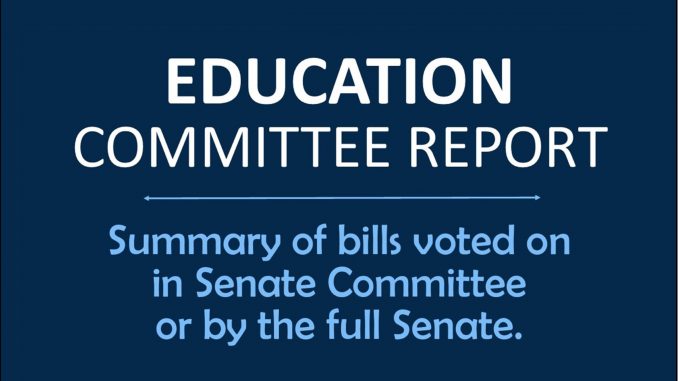
SF 455 – Transportation and district per pupil equity bill;
SF 2272 – Eliminates the state accreditation process for community colleges;
SF 2341 – Requires students to pass the U.S. Citizenship and Immigration civics test to graduate;
SF 2344 – Public higher education regulation of public forums and freedom of expression;
HF 2230 – FY19 Supplemental School Aid (SSA).
FLOOR ACTION:
SF 455 addresses two of the inequities in the school finance formula: the district cost per pupil and transportation funding. The House and Senate had different approaches to this issue. The Senate passed a comprehensive approach last year that would have equalized all districts for per-pupil costs and transportation inequities. That 10-year approach would have cost an estimated $200 million. The House version is a one-year effort on both of these inequities, costing $14.2 million. SF 455, as amended and sent to the Governor, is the House version, which buys down the highest inequity districts in per-pupil and transportation funding for one year.
For FY19, $5 would be added to state cost per pupil. All districts receive either property tax replacement or an increase in spending authority under this division. Only the school districts with the highest transportation costs will receive transportation assistance. If a school district exceeds the statewide adjusted transportation cost per pupil, a portion of $11.2 million in one-time money will be distributed. For the transportation division, 140 districts will receive funding, which is 42 percent of all Iowa school districts.
[2/26: 45-4 (No: Bisignano, D. Johnson, McCoy, Petersen; Absent: Chelgren)]
SF 2272 eliminates the state accreditation process for community colleges established by the State Board of Education and implemented by the Department of Education. The process was required to be integrated with the accreditation process of the Higher Learning Commission. The state accreditation process currently only happens once every 10 years, with a mid-review every five years. Two of the 15 community college presidents support this bill. The rest of the presidents do not support removing state accreditation. Community colleges would still be accredited by the Higher Learning Commission, which does not review state standards or requirements. This bill raises concerns about the quality of key programs and measures that the state has prioritized.
[2/27: 30-20, party-line (Yes: D. Johnson, Republicans)]
SF 2341 requires students to pass the U.S. Citizenship and Immigration civics test to graduate from high school. Those seeking a high-school equivalency diploma also must pass such an examination. Students must pass with a score of at least 60 percent correct on an examination that includes all 100 questions. Students can take the citizenship examination at least once each school year in grades 7 through 12 until the student has achieved a passing score. A school must have the examination proctored and completed without the use of ancillary materials. The Department of Education must approve alternative assessment measures for students requiring special education and those identified as having limited proficiency in English. There is a fiscal impact of $60,000 to the Department of Education to develop these alternative assessments. School districts may incur additional costs for proctoring, but the extent of those costs is unknown.
[2/28: 38-12]
SF 2344 relates to public forums, freedom of expression, and freedom of association at public community colleges and universities. This bill creates a new Code chapter requiring the boards governing public postsecondary institutions to adopt a policy that includes statements describing the functions and rules of institutions with regard to learning; protected speech; the freedom to discuss issues within the limits of reasonable viewpoint-neutral and content-neutral restrictions on time, place and manner of expression; freedom to assemble and engage in spontaneous expressive activities that are not unlawful and do not disrupt the functioning of the institution; and public areas of campuses as traditional public forums.
Concerns expressed by the Board of Regents expressed – including (a) that the bill would have required their whole campus to be a “public forum”; (b) that it will require a judge to decide a person’s claimed sincerity; and (c) that the University of Iowa is currently in litigation and the courts should decide its case before the Legislature acts — were resolved in committee.
[2/28: 29-20 (party-line)]
HF2230 sets the basic school funding for the 2018-2019 school year at 1 percent for both the regular state aid to schools and the categorical state aid. This bill establishes a cost per pupil of $6,731, an increase of $67 per pupil. The 1 percent allowable growth rate will cost the state $3.222 billion, an increase of $32 million over last year. Based on Republican funding assumptions, they will continue a $15 million AEA reduction in the Standings Bill. The Senate receded from their amendment to address per-pupil and transportation inequities in school funding on this bill.
Categorical State Aid: The FY19 allowable growth rate for the State Categorical Supplements (Teacher Leadership and Compensation, Teacher Salary Supplement, Professional Development and Early Intervention) is $527.2 million, an increase of $6.7 million. Funding amounts for each initiative include:
- Teacher Salary Supplement at $298.9 million, an increase of $3.7 million.
- Professional Development Supplement at $33.9 million, an increase of $0.4 million.
- Early Intervention Supplement (class-size) at $34.9 million, an increase of $0.4 million.
- Teacher Leadership and Compensation at $159.5 million, an increase of $2.1 million.
Property Taxes: For the last few years, the Legislature has decided whether to pay for the incremental increase in property taxes associated with an increase in the percentage growth for schools. The total funding for this effort is now $51.5 million, an increase of $4.7 million over last year.
[2/26: 28-21, party-line (No: D. Johnson, Democrats)]
